

JILIR – The Journal of International Law & International Relations. Cookies op Trouw.nl. Trouw.nl gebruikt cookies en vergelijkbare technologieën ("cookies") onder andere om u een optimale gebruikerservaring te bieden.

Ook kunnen we hierdoor het gedrag van bezoekers vastleggen en analyseren en daardoor onze website verbeteren. Cookies van onszelf en van derden kunnen worden gebruikt om advertenties te tonen en artikelen aan te bevelen op Trouw.nl die aansluiten op uw interesses. Ja, ik accepteer cookies Ook derden kunnen uw internetgedrag volgen. Cookies kunnen gebruikt worden om op sites van derden relevante advertenties te tonen. De serviceafdeling is te bereiken op telefoonnummer 088 - 0561 588. Maarten van Rossem - Het Internationaal Strafhof - Maarten! Door: Bart de Koning Een lachertje voor dictatorsMT nr. 5/2015 De oprichting van het Internationale Strafhof in 2002 werd toegejuicht: eindelijk was er een permanent instituut om oorlogsmisdadigers te vervolgen.
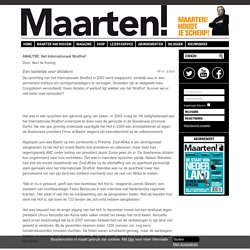
Sindsdien zijn er welgeteld twee Congolezen veroordeeld. Geen dictator of warlord ligt wakker van het Strafhof. Kunnen we er niet beter mee ophouden? Het was in alle opzichten een gênante gang van zaken. Afgelopen juni was Bashir op een conferentie in Pretoria. ‘Wat er nu is gebeurd, geeft aan hoe kwetsbaar het Hof is,’ reageerde James Stewart, een assistent van hoofdaanklager Fatou Bensouda in een interview met Nederlandse regionale kranten. Het rijtje zeperds zou nog eindeloos aangevuld kunnen worden: van de 36 mensen die sinds 2002 bij het Hof zijn aangeklaagd, zijn er tot nu toe slechts twee veroordeeld. Dat is nogal een magere score voor een instituut dat inmiddels 1,2 miljard euro heeft gekost, met een jaarbudget van 124,5 miljoen. Resultaat: Slachtoffers Bron: Elsevier. Supranational Courts and the Law of Democracy: The European Court of Human Rights by Richard H. Pildes.
New York University School of LawSeptember 14, 2016 NYU School of Law, Public Law Research Paper No. 16-43 Abstract: This Article involves a systematic exploration of the European Court of Human Rights’ decisions in cases involving the actual structure of the democratic process itself.
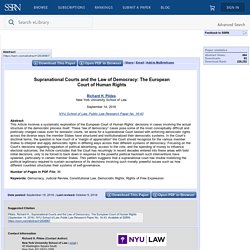
These “law of democracy” cases pose some of the most conceptually difficult and politically charged cases even for domestic courts, let alone for a supranational Court tasked with enforcing democratic rights across the diverse ways the member States have structured and institutionalized their democratic systems. In the Court’s doctrinal terms, the question is how much of a “margin of appreciation” the Court should recognize for the various member States to interpret and apply democratic rights in differing ways across their different systems of democracy. Russia withdraws signature from international criminal court statute. Blog Archive The Re-branding of the International Criminal Court (and Why African States Are Not Falling For It) [Christine Schwobel-Patel is Senior Lecturer and co-Director of the Critical Approaches to International Criminal Law research cluster at the University of Liverpool.]
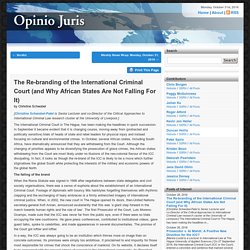
The International Criminal Court in The Hague, has been making the headlines in quick succession. In September it became evident that it is changing course, moving away from (protracted and politically sensitive) trials of heads of state and rebel leaders for physical injury and instead focusing on cultural and environmental crimes. In October, several African states, including South Africa, have dramatically announced that they are withdrawing from the Court. Although the changing of priorities appears to be diversifying the prosecution of grave crimes, the African states withdrawing from the Court are most likely under no illusions of the neo-colonial flavour of the ICC dissipating. The failing of the brand In light of its focus on Africa, there have been long-standing demands to try former US-President George W. Zuid-Afrika ondermijnt Strafhof. Het verzoek van de Zuid-Afrikaanse regering om opzegging van lidmaatschap van het Internationaal Strafhof in Den Haag bedreigt de geloofwaardigheid van Afrika’s gidsland voor de mensenrechten.
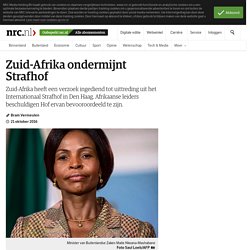
Maar ook die van het Strafhof zelf. „Dit is het begin van een langzame dood’’, zegt Thijs Bouwknegt, docent Genocide Studie aan de Universiteit van Amsterdam. „Dit is tekenend voor de teloorgang van de universele mensenrechtenideologie.” Burundi Lawmakers Vote to Withdraw From ICC; Would Be 1st. KIGALI, Rwanda — Lawmakers in Burundi overwhelmingly voted Wednesday in support of a plan to withdraw from the International Criminal Court, something no country has ever done.
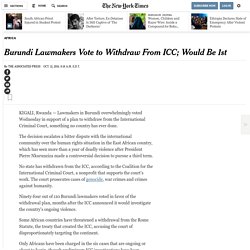
The decision escalates a bitter dispute with the international community over the human rights situation in the East African country, which has seen more than a year of deadly violence after President Pierre Nkurunziza made a controversial decision to pursue a third term. No state has withdrawn from the ICC, according to the Coalition for the International Criminal Court, a nonprofit that supports the court's work.
The court prosecutes cases of , war crimes and crimes against humanity. Ninety-four out of 110 Burundi lawmakers voted in favor of the withdrawal plan, months after the ICC announced it would investigate the country's ongoing violence. Only Africans have been charged in the six cases that are ongoing or about to begin, though preliminary ICC investigations have been opened elsewhere in the world. Celstraf Argentijnse luchtmachtcommandant om verdwijningen. 50Questions NLD. Inter-American Court of Human Rights. NJB Vooraf: De Kosovo-uitspraak van het Internationale Gerechtshof: dynamiek of dynamiet? - NJB - Nederlands Juristenblad.
Exploring the Evolution of International Law: Conversations with Leading Judges - The Faculty of Law.